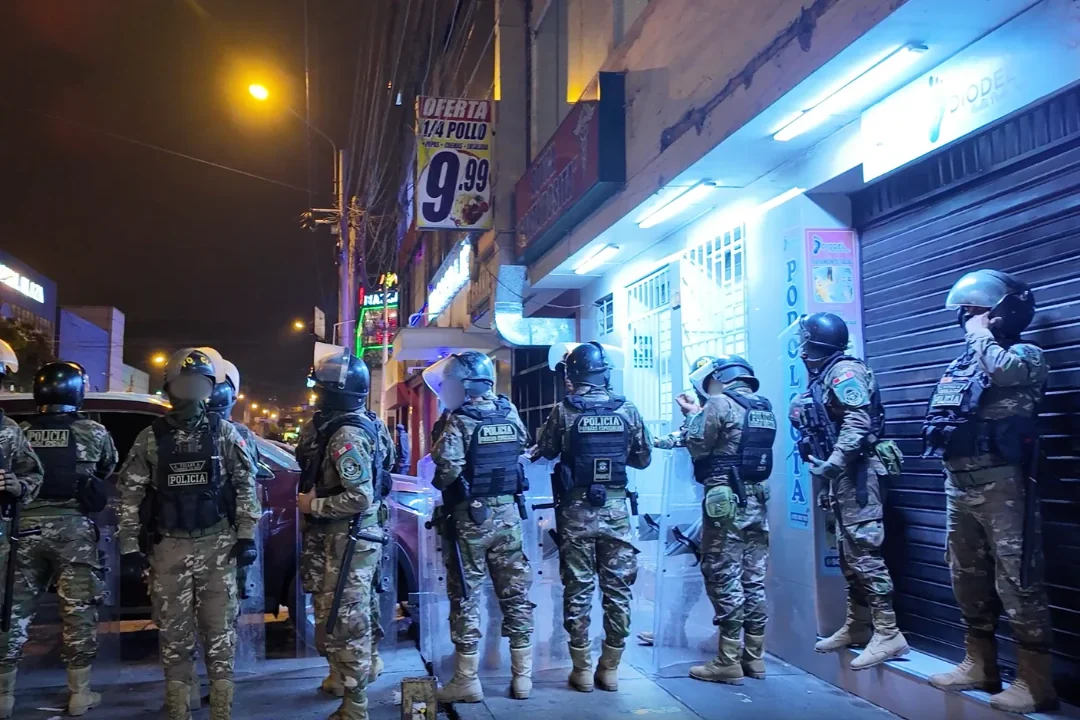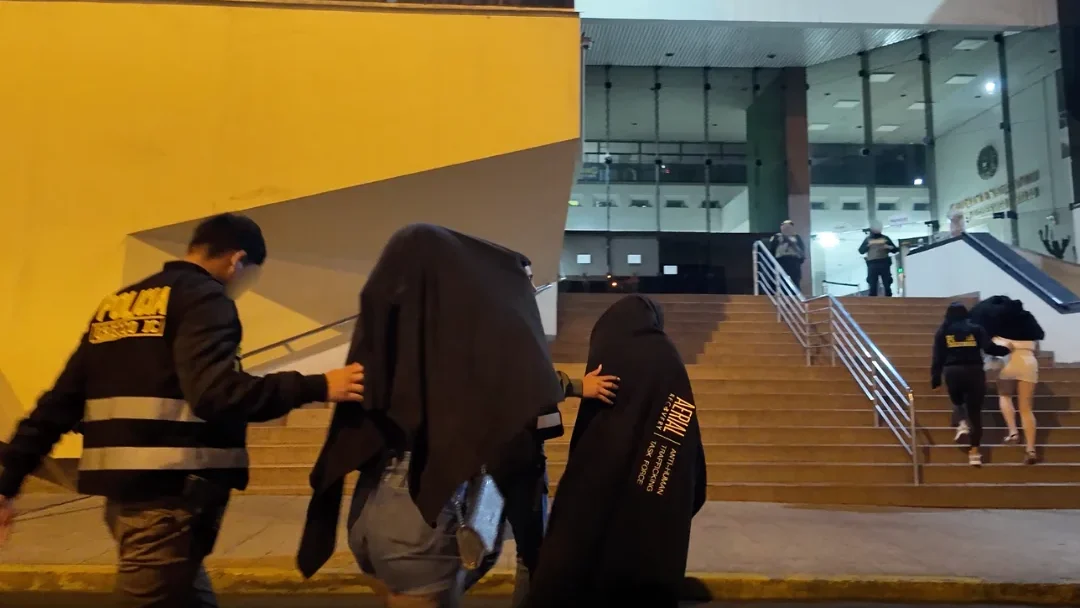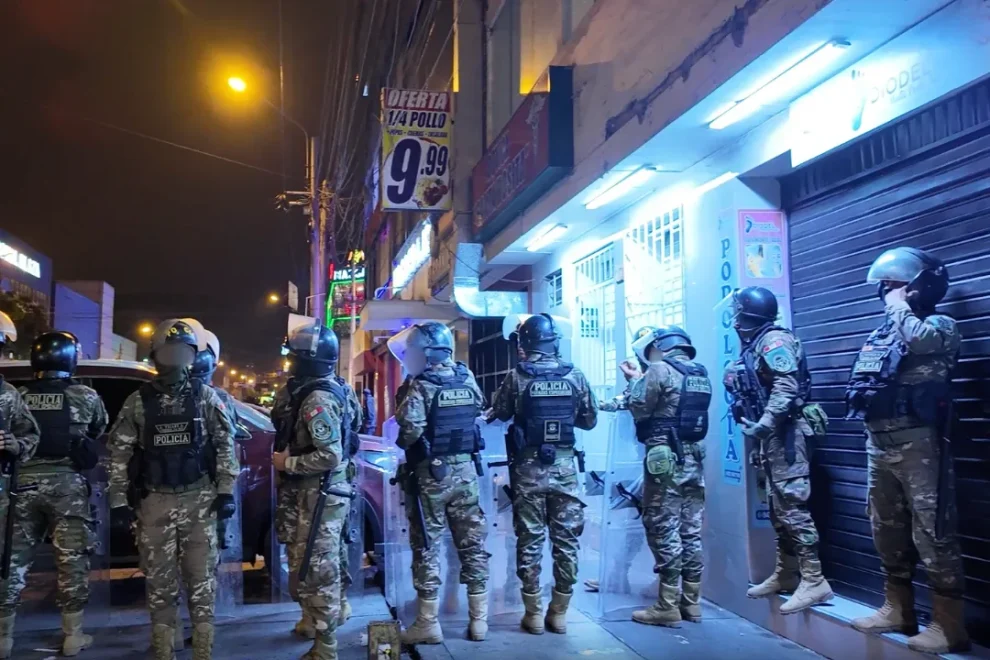EXCLUSIVE — Violent gang members linked to the international crime syndicate Tren de Aragua were swept up by Peruvian law enforcement during a human trafficking sting in northern Lima this past weekend.
Behind the scenes, Aerial Recovery, a U.S. nonprofit organization mobilizing military veterans, was helping empower the teams and ensure the victims received necessary care and treatment.
The Peru National Police, public prosecutor’s office, and other organs of government and law enforcement conducted raids from late Saturday night into Sunday morning, arresting 10 alleged operatives of La Guerrilla Pobre — a gang operating as a faction of Tren de Aragua.
The Northern Lima District Attorney’s Office announced the strike against the gang via social media, reporting eight victims rescued from illicit crime dens operating clandestinely in public-facing businesses throughout Independencia, San Martin de Porres, and Los Olivos.

Women victimized by the network of alleged traffickers, some of them minors, were reportedly lured with promises of legitimate work and had their passports seized by their captors.
Eight locations were raided throughout the night, necessitating hundreds of officers and dozens of ancillary personnel to handle the legal end of the operation.
Provincial Prosecutor Luisa Ines Quispe Asmat spearheaded the sting, in which cellphones, computers, written documents, and other troves of information that Asmat hopes will further compromise the gang were confiscated.
In its announcement, the office gave a special shout-out to Aerial Recovery, which coordinates military veterans, intelligence agencies, first-responder services, and other backgrounds to aid anti-trafficking efforts worldwide.
“These young women were lured under false pretenses, stripped of their freedom, and told that escape meant death,” Aerial Recovery co-founder and CEO Britnie Turner said. “This operation demonstrates what is possible when governments and nonprofits work in lockstep to dismantle evil and rescue the vulnerable.”
Turner spoke to the Washington Examiner about her organization’s role in the raids and its overarching mission to give veterans who are listless or depressed after the end of their service another route to use their skills and training.
“We repurpose veterans, first responders, law enforcement, all of that, to go rescue kids. That’s what we do. That’s our specialty,” Turner said. “They have all this training already in them. We obviously do additional training to specialize in this work, but it’s a really cool kind of match made in heaven of giving these veterans a focus, which saves their lives. And it saves their lives to go continue to save lives.”
Turner’s fellow co-founder and husband, Jeremy Locke, served for decades in the U.S. Army Special Forces with five combat deployments.
“He’s a 20-year veteran — 10 of those years as a Green Beret Special Forces — and so he has over $10 million for government training in him,” Turner said. “We can come and help, we have people who have the heart to help you with this specific issue. And we will offer you everything from the current best practices on how to handle survivors when you rescue them, to how to do a raid, to how to find [perpetrators].”
Aerial Recovery works with foreign governments through private-public partnerships that allow it to play a supportive role while leaving the missions to the appropriate law enforcement agencies, which Turner quickly pointed out are the drivers of justice.
“When we work with these countries, we’re very much doing the Special Forces approach, which is working as a force multiplier — so by, with, and through the locals,” Turner said. “It’s all about bolstering their efforts, giving them confidence, giving them resources so they’re proud of the fight they have instead of us being their savior.”
Organized crime in Peru is responsible for an overwhelming wave of violence and criminal exploitation. The national government has declared various states of emergency to combat the lawlessness, but ingrained corruption and underwhelming resources have resulted in little progress.
Carlos Maza, Aerial Recovery’s director of anti-human trafficking efforts, told the Washington Examiner during a phone call from Peru that the organization is focused on law enforcement outfits that have “limited financial resources” and need experts capable of rendering support at all stages of the process.
“We empower the Peruvian National Police to do their role, which is finding these bad guys, investigating them, and ultimately identifying and rescuing as many girls as possible — that’s where we come in,” Maza said.
“The Peruvian National Police, just like most Latin American law enforcement entities, have very limited financial resources to do the work that not only focuses on a bad guy, but most importantly, is focused on the victims — the girls that have been trafficked,” he continued. “[Law enforcement officers’] role is to put the bad guy in jail and someone else to come and worry about the victims.”
International cooperation to dismantle gangs in Latin America is not just an act of charity and humanitarian vocation for veterans. The crime syndicates that operate in places such as Peru have networks that extend across borders, and arresting members in one country can have rippling effects across continents.

“We’ve got to completely dismantle them, and the way you do that is you take their money away and their assets,” Maza said. “There’s still much more to do. This is a huge organization.”
President Donald Trump issued an executive order designating Tren de Aragua as a terrorist organization on Jan. 20. He cited the gang’s “complex adaptive systems, characteristic of entities engaged in insurgency and asymmetric warfare” that “constitute a national-security threat beyond that posed by traditional organized crime.”
Seven other cartels were also included in the order.
MORE THAN 70 ILLEGAL IMMIGRANTS ARRESTED IN ICE OPERATION AT CARTEL-RUN NIGHT CLUB
This was followed by the State Department making a similar designation a month later, affirming the gang’s status as a foreign terrorist organization.
Since then, the U.S. government has coordinated action against the gang under the Alien Enemies Act. The war against Tren de Aragua and its affiliates remains a top priority of the Trump administration.








 | Agentes de la Dirección Contra la Trata de Personas y el Tráfico Ilícito de Migrantes desarticularon la banda criminal Guerrilla Pobre, vinculada al Tren de Aragua, por trata de personas con fines de explotación sexual. Se decomisó drogas e incautó una pistola.
| Agentes de la Dirección Contra la Trata de Personas y el Tráfico Ilícito de Migrantes desarticularon la banda criminal Guerrilla Pobre, vinculada al Tren de Aragua, por trata de personas con fines de explotación sexual. Se decomisó drogas e incautó una pistola. 















